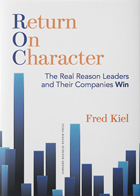 The ethics of large companies are constantly being debated.
The ethics of large companies are constantly being debated.
The focus on shareholder value over and above other stakeholders — the employees on zero hour contracts, the sweat shop suppliers in developing countries, the governments losing out on tax revenues because of tax avoidance by multinationals — has given business a bad name with the public.
As pointed out in a book recently reviewed in these pages, 2020 Vision, the response of many companies is to withdraw from the debate together, reasoning that it's better to stay out of the public eye as much as possible when it comes to revealing anything of their inner workings, and certainly to avoid making any statements about ethical policies that might come back to haunt them.
Fred Kiel's aim in this book is to use empirical research to prove that companies led by leaders with good characters "win". By this, he means not only win for society as a whole, but also in terms of shareholder returns.
He has lots of research to back this up, including a seven-year study of more than 8,000 employees and 84 CEOs and executive teams at publicly listed companies.
His aim was to study the connection between leadership character and business results, and what the research showed was that "character-driven leaders and their teams consistently deliver as much as five-times greater returns for their organizations than those run by self-focused leaders".
Kiel said the book is aimed at everyone from those leaders (so they can reform), to senior managers, the boards of companies looking to recruit the right leader, and even human resources professionals.
But the book is really aimed at the leaders, and particularly the self-focused ones, to try and get them to understand how their behaviour may be harming the organisations they are leading.
Kiel's organisation is "a boutique consultancy which helps leaders and organisations connect their actions and behaviour to their values and principles", but thankfully the book isn't a long advert for using their services.
Instead, it seems to be Kiel's attempt — at the end of his working life (he tells us he is 75 years old) — to change the way companies and their leaders think about their role. As he puts it: "You may be the only person in your life who is unaware of the shortcomings in your character".
Kiel contrasts virtuoso leaders with self-focused ones. Virtuoso is a slightly unfortunate coining since it suggests virtuous, but Kiel defines it as follows: "Although the term virtuoso typically describes a person who possesses outstanding technical ability at singing or playing a musical instrument, it applies very well to the act of leadership. Not only is leadership based on performance, but it is an art that requires disciplined practice as well as ability."
He describes the four qualities that make up one of those leaders as integrity, responsibility, forgiveness and compassion. It's as good a list as any other, although there are other elements that might be added, such as performance.
Kiel wants to discourage the oft-defended concept of leadership first suggested by Adam Smith in the Wealth of Nations — the idea that "when people single-mindedly pursue their own self-interests, an 'invisible hand' emerges in a free market context that serves the common good".
As Kiel says: "Instead of this invisible hand working to strengthen the social fabric, we more often find ourselves caught in the grip of cold, rational acquisition, as it sweeps through the economic landscape and greedily grabs up or crushes anything or anyone who gets in the way."
The author hopes his research "may be able to provide a foundation for better business education, training, and practice" and says that he wrote the book "to begin laying that foundation".
It's a laudable, if very ambitious, aim, but the book is worth reading for the advice it gives on assessing your own management style — and failings. And, if nothing else, the questionnaires for self-assessment may have you thinking seriously about the way you conduct yourself professionally.
As Kiel says of one of the case studies in the book: "Mark didn’t have a skill deficit; he had a character habit deficit of failing to own up to his own mistakes."
Kiel is honest enough to admit his own mistakes early on in the book when he describes his own biography, and honesty — to others, to yourself — is a constant theme. It makes it a salutary and refreshing read. I only wish I shared Kiel's optimism.
He's aware that people "have a well-honed skill of denial" but, as he points out, "denial has its dangers. The old saying, 'the higher the monkey climbs the tree, the more others can see his behind' speaks to the keen focus we place on leadership behaviour, and how clueless leaders can be as to what the view from below reveals".
As the blurb would have it: "Whatever level we're at, we now have the power to develop the character habits of leadership." I hope this book encourages that process.
Harvard Business Review Press, £19.99
Tom Otley








